With their regal stature, intense gaze, and commanding presence, it’s no wonder German Shepherds rank as one of the most popular dog breeds worldwide. But what exactly makes these intelligent canines such outstanding companions and versatile working dogs?
This comprehensive guide explores everything you need to know about German Shepherds – from their origin story and breed characteristics to proper care, training tips, and fascinating facts. Whether you’re a new or seasoned Shepherd owner, this is your go-to resource for fully understanding these magnificent dogs.
Buckle up, friend – you’re about to enter the captivating world of German Shepherds!
Table of Contents
- 1 The Making of an Iconic Breed: A Brief History
- 2 Getting to Know the Breed: German Shepherd Characteristics
- 3 Caring for Your German Shepherd: Health, Nutrition, and Grooming Needs
- 4 Training Your German Shepherd: Vital Techniques for a Well-Behaved Companion
- 5 The Many Coat Colors of the German Shepherd Dog
- 6 German Shepherds as Esteemed Service Dogs
- 7 Owning a German Shepherd: Is This Breed Right For You?
- 8 The Takeaway on This Extraordinary Breed
- 9 Related posts:
- 10 Unveiling the Secrets of the Black German Shepherd
- 11 German Shepherd Puppies (25 of the Cutest Pups)
- 12 Long Hair German Shepherd: A Comprehensive Guide
- 13 Raising a German Shepherd Puppy: Everything You Need to Know
The Making of an Iconic Breed: A Brief History
The journey of the German Shepherd began in 1899 in Karlsruhe, Germany, with Captain Max von Stephanitz, a former cavalry captain and noted dog enthusiast. Disappointed by the disorganization of sheepherding dogs in his country, von Stephanitz set out on a quest to create the ideal working dog breed.

Attending a dog show in 1899, von Stephanitz was drawn to a wolfish-looking dog named Hektor Linksrhein. Recognizing Hektor’s intelligence and athleticism, von Stephanitz immediately purchased the dog and changed his name to Horand von Grafrath. Horand became the first registered German Shepherd and the founding sire of the breed we cherish today.
With Horand as the blueprint, von Stephanitz established the Society for the German Shepherd Dog and began implementing scientific breeding practices to refine and standardize the breed’s traits. He envisioned creating an intelligent, versatile working dog for herding, police and military work, search and rescue, guide dogs, and loving family companions.
By the early 1900s, German Shepherds gained international fame for their working abilities. Their agility, bravery, and obedience made them natural as Red Cross rescue dogs during World War I. The breed’s popularity skyrocketed after Rin Tin, a German Shepherd rescued from a World War I battlefield, became a Hollywood star in the 1920s for his incredible acting ability.

German Shepherds remain one of the most recognized and beloved breeds worldwide. They consistently rank in the top ten most popular breeds in the United States and have made outstanding contributions across various fields.
Getting to Know the Breed: German Shepherd Characteristics
So, what exactly makes German Shepherds such exceptional dogs? Let’s explore some of the fundamental physical and behavioral traits that define this breed:
Physical Features
- Medium to a large-sized dog with a muscular build. Males stand 24-26 inches tall; females 22-24 inches.
- Weight ranges from 49-88 pounds. Sturdy bone structure.
- Distinctive head with erect, pointed ears. Alert and intelligent expression.
- Coat colors include black and tan or all black. Some white markings are permitted.
- Double-layered waterproof coat with thick undercoat and coarse outer coat. Provides insulation and shedding resistance.
Personality Traits
- Highly intelligent, ranking 3rd among dog breeds. Eager to learn and quickly grasp new skills.
- Loyal and deeply devoted to their family. Excellent watchdogs and guardians.
- Confident, courageous, and steady temperament. Excellent nerve strength.
- Energetic and athletic. Requires plenty of activity and mental stimulation.
- Trainable and obedient when handled firmly yet fairly. Aloof towards strangers.
- Strong protective and territorial instincts. Early socialization is essential.

This unique combination of intelligence, athleticism, trainability, and loyalty makes German Shepherds exceptional working dogs and companions. However, proper care and training are crucial to healthily nurturing these natural traits.
Caring for Your German Shepherd: Health, Nutrition, and Grooming Needs
While resilient and hardy, German Shepherds have certain health conditions and care needs requiring diligence and awareness as owners. Let’s explore some top considerations:
Common Health Issues
- Hip and elbow dysplasia – malformed joints requiring treatment.
- Bloat – potentially fatal twisting of the stomach. Feeding prevention is needed.
- Degenerative myelopathy – spinal cord disease causing paralysis. More prevalent in older dogs.
- Allergies – environment and food allergies may cause skin irritation.
Regular vet checkups, diagnostics, and early treatment are vital to managing conditions. Reputable breeders screen breeding dogs for hip/elbow dysplasia.

Exercise Needs
Highly active and energetic! German Shepherds need 60-90 minutes of exercise daily.
- Walks, runs, hiking, swimming – excellent aerobic activities.
- Fetch, agility training, nosework – provide mental stimulation.
They are prone to anxiety, boredom, and destructive behaviors without adequate activity. Socialization and obedience training are also mentally enriching.
Nutrition Tips
- High-quality protein sources like beef, chicken, and fish. Support muscle development.
- Limited grains/fillers. It can trigger food sensitivities.
- Omega fatty acids for skin and coat health.
- Glucosamine/chondroitin supplements can benefit joints.
Portion control is essential to prevent obesity.
Grooming Essentials
- Twice weekly brushing removes dead hair and distributes skin oils.
- Bathe only when needed using dog-specific shampoo.
- Trim nails regularly to avoid cracked nails and discomfort.
- Brush teeth weekly. Dental chews/treats are also beneficial for oral health.
- Check and clean ears weekly for infection prevention.
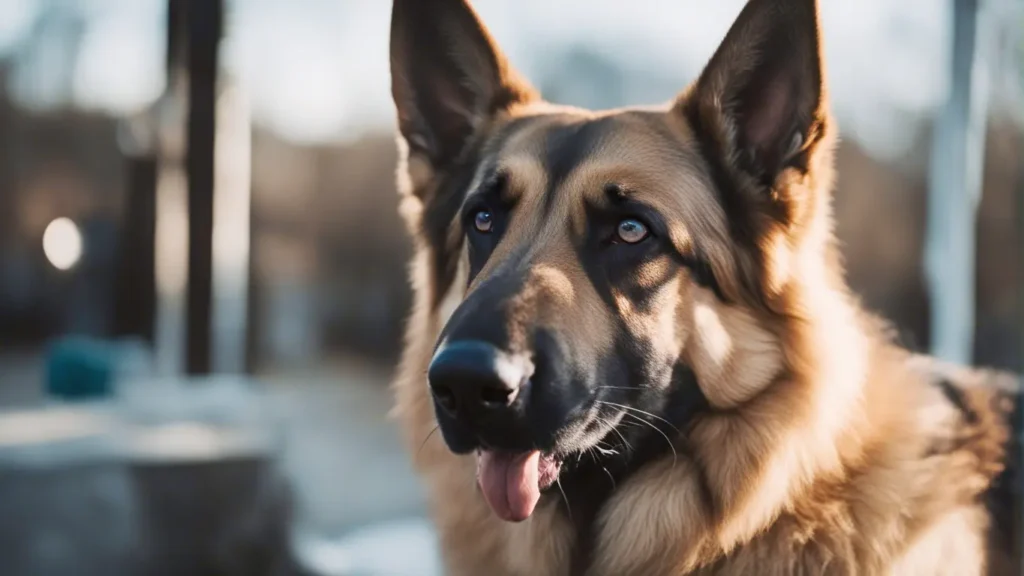
Your German Shepherd will thrive for years With proper nutrition, activity, and grooming!
Training Your German Shepherd: Vital Techniques for a Well-Behaved Companion
German Shepherds are working dogs, meaning they thrive when given a job and purpose. Training is fundamental to fulfilling their potential and creating an enjoyable partnership. Here are some top techniques to remember:
Start Young With Socialization
Early socialization is critical for a confident, well-adjusted German Shepherd. Introduce them to new places, people, animals, and experiences starting at 7-12 weeks old. Puppy kindergarten is hugely beneficial. Maintain socialization into adulthood.
Use Positive Reinforcement
This breed wants to please its owner and responds extremely well to positive reinforcement training methods. Reward desired behaviors immediately with treats, praise, and playtime. Avoid punishment or harsh corrections, which can damage trust.
Establish Clear Leadership
As the owner, you must establish yourself as the calm, consistent leader of the pack. Set and reinforce household rules from the start, like no jumping on furniture or bolting outdoors. Be patient yet firm when correcting unwanted behaviors.
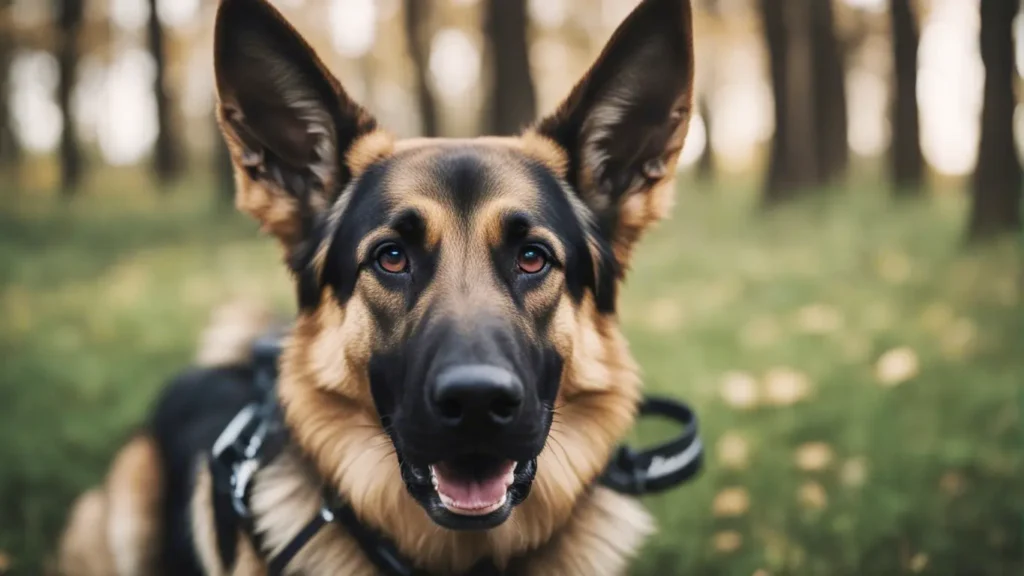
Prevent Separation Anxiety
Alone-time training prevents separation anxiety before it starts. Begin leaving your Shepherd alone gradually from a young age, providing toys/treats for comfort. Avoid making departures overly emotional.
Mental Stimulation is Essential
German Shepherds thrive when their intelligence is engaged. Incorporate puzzle toys, snuffle mats, obedience training, and scent work. A tired puppy is a happy puppy!
With dedication and compassion, you can train your German Shepherd to be a trustworthy companion. Seek help from accredited trainers if needed.
The Many Coat Colors of the German Shepherd Dog
Beyond their classic black and tan saddle-backed coats, German Shepherds come in a diverse array of stunning colors. Here’s an overview of some approved coat variations by breed standards:
Sable-Agouti banded hairs to create a multi-colored effect with black tips. Appears grey, fawn, red, or tan.
Black – A rich, jet-black coat. Small white chest markings are permitted.
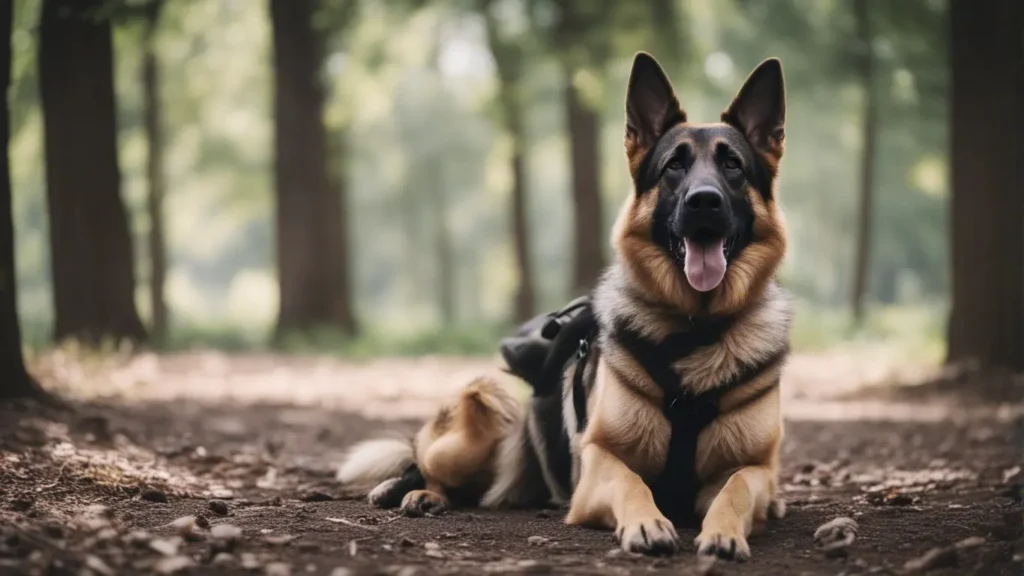
Bi-color – Black and tan with increased black pigmentation, including a black face mask and legs.
All White – Very rare. Controversial among breeders due to health concerns.
Blue – A rare dilute gene causes a blue-grey coat with black pigmentation.
Liver – Brown pigmentation instead of black. Extremely rare. Undesirable per breed standards.
While solid black, classic black and tan remain the most common, responsible German Shepherd breeders occasionally produce these other stunning colors. Remember, coat color does not affect a dog’s temperament or ability!
German Shepherds as Esteemed Service Dogs
Beyond their fame as companions and show dogs, German Shepherds have a long-standing history as service dogs assisting people with disabilities and working professionals alike. Their intelligence, athleticism, trainability, and eagerness to work suit them for these critical roles.
Police K-9 Unit Partners
The police force relies heavily on German Shepherds to support various law enforcement tasks. Their acute sense of smell and ability to track scents makes them excel at searching for missing persons or fugitives. Police dogs are also trained to detect explosives, drugs, and other illegal contraband.
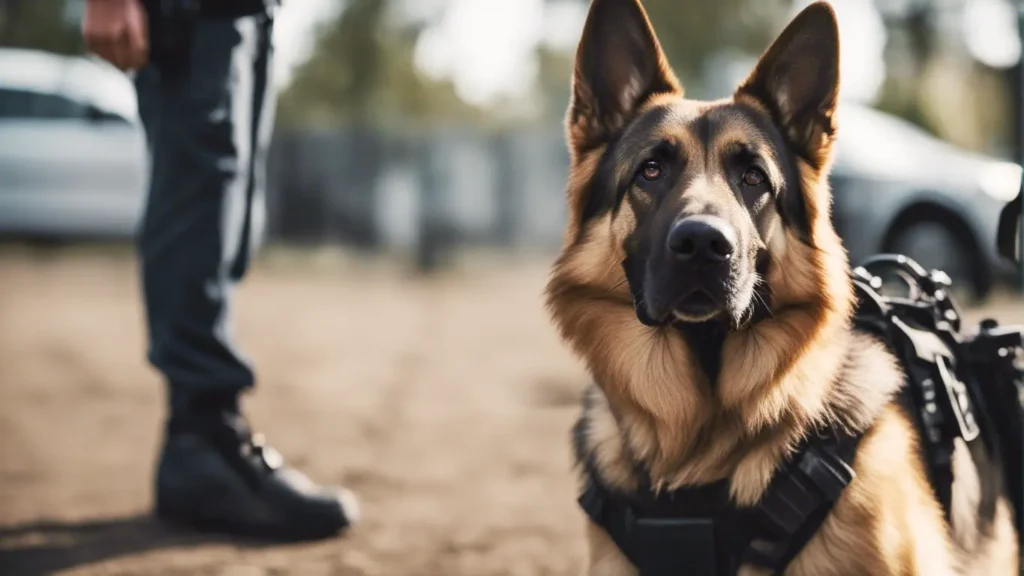
During confrontations, a German Shepherd’s speed and strength allow them to apprehend suspects quickly. Yet they are also disciplined enough to release on command. Their mere presence alongside police officers often helps diffuse tense situations.
Guide Dogs for the Blind
German Shepherds possess exceptional vision and awareness of their environment. Combined with their trainability and gentleness, these traits allow them to guide people who are blind or have impaired vision successfully.
As guide dogs, German Shepherds walk slightly ahead of their handlers to lead them safely around obstacles. They respond to verbal cues and adapt to the handler’s pace. Their near-constant focus and loyalty provide freedom and security.
The Versatile Service Dog
Beyond police work and guiding, German Shepherds serve people with disabilities in numerous capacities:
- Hearing Dogs help alert those with hearing loss to essential sounds.
- Medical Alert Dogs can detect subtle scent changes that precede health events like seizures.
- Mobility Assistance Dogs aid those with mobility impairments by retrieving items or providing balance support.
- Therapy Dogs deliver comfort and emotional support in hospitals and schools.
The German Shepherd’s astounding versatility and work ethic have made them a mainstay in service fields for over a century. Their devotion to these roles has truly changed lives for the better.

Owning a German Shepherd: Is This Breed Right For You?
Before welcoming any dog into your home, assessing whether the breed will complement your lifestyle and personality is essential. So, is a German Shepherd a good match for you? Let’s weigh the pros and cons:
Pros of Owning a German Shepherd:
- Exceptionally versatile – excels at various working roles and family life.
- Highly intelligent and trainable. Eager to take on new challenges.
- Form deep, loyal bonds with their owners. Protective of family.
- Athletic and energetic. Great adventure buddies and exercise partners.
Cons to Consider:
- Require extensive exercise and mental stimulation daily. Prone to boredom and anxiety without adequate activity.
- Large size and energy levels can overwhelm young children. Need supervision.
- Heavy shedders. Require frequent brushing and home cleanliness.
- Some aggression issues if not properly socialized. Extensive training is required.
- Prone to specific health problems like hip dysplasia. Potential for high vet bills.
As you can see, German Shepherds make outstanding companions but require an owner committed to proper training, activity, and care. If you can provide structure, patience, and affection, you’ll be rewarded with a loyal friend for life.
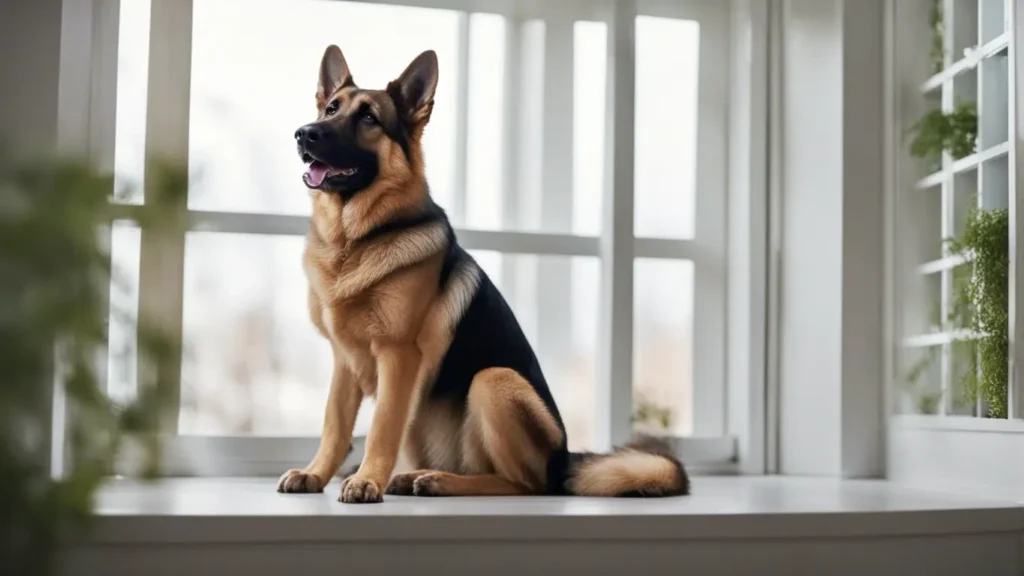
The Takeaway on This Extraordinary Breed
What a fantastic breed the German Shepherd is! From their noble origins and versatility to their distinctive looks and traits, it’s clear why these dogs maintain such immense popularity across the globe.
Yet owning a German Shepherd comes with great responsibility. They need extensive exercise, mental engagement, health monitoring, and dedicated training. But for the right owner willing to be a strong leader and partner, a German Shepherd will be their most loyal and rewarding companion through life’s many adventures.
We hope this comprehensive guide equipped you with the knowledge to make the most informed decision about welcoming one of these magnificent dogs into your home. Here’s to many years of friendship with your German Shepherd – cheers to you both!